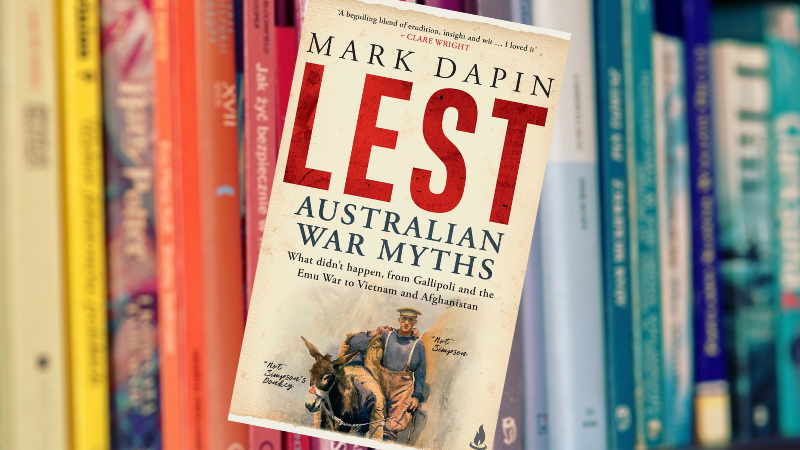Lest: Australian War Myths
by Mark Dapin
Scribner
Former soldier and President of the Victorian Returned and Services League (RSL) Bruce Ruxton is on record as stating “I don’t remember a single poofter from World War II.”
Journalist and historian Mark Dapin corrects Rushton’s blasphemous statements that were reinforced by several ‘experts’. He says that, like the queer soldiers, homosexuality was in Australian wars and “history makes little sense if it is overlooked”.
Dapin does a great job in separating truth from myths that have survived in Australian war history. He has a PhD in military history from the Australian Defense Academy and has interviewed many other historians for his Radio National program Myths of War.

Dapin addresses what he has been able to find out did and didn’t happen in his fascinating book – from Gallipoli to the Emu War to Vietnam to Afghanistan – and tries to have a laugh along the way.
He says that the way things are remembered have histories themselves – “histories have histories”. The creation of myths involves the warping of facts and very often convenient omissions and “myths meld with memories”.
I remember learning all about Simpson and his donkey in primary school and Dapin uses the illustration we had in our text book for the cover of his book. But Dapin points out that the soldier in the illustration is not in fact Simpson and it is not Simpson’s donkey.
Many myths surround the story of the soldier who rescued wounded men at Gallipoli with a donkey. Told to successive generations of school children, Simpson’s actions are regarded as the highest expression of mateship and even helped define our national identity.
Myths can change over the years. ANZAC Day used to be a solemn funeral march for the 60,000 who died in the First World War. Now it seems to be a mixture of sentimentality and nationalistic propaganda, and is a celebration rather than a commemoration.
Dapin reminds us that Australia is the only country to declare war on its national emblem when drought drove emus to destroy vast plains of newly planted wheat. Many myths surround the Emu War of 1932 where the flightless birds were chased to the rabbit-proof fence and killed with machine guns supplied by the government.
Then there is the 1968 anti-war pamphlet with instructions on how to avoid being conscripted into the army – “be gay” – as homosexual behaviour was a dischargeable offence in the army at least from 1944 to 1992.
Dapin’s thoroughly researched book on Australian war myths sheds light on realities that differ from myths, and makes sure we don’t celebrate the wrong people while forgetting about the real heroes.
Lezly Herbert





